For the 2025 school year, there is 1 public preschool serving 99 students in Maysville Local School District.
Public Preschools in Maysville Local School District have a diversity score of 0.13, which is less than the Ohio public preschool average of 0.58.
Minority enrollment is 7% of the student body (majority Black and Hispanic), which is less than the Ohio public preschool average of 39% (majority Black).
Overview
This School District
This State (OH)
# Schools
4 Schools
839 Schools
# Students
1,792 Students
334,112 Students
# Teachers
95 Teachers
18,897 Teachers
Student : Teacher Ratio
19:1
19:1
District Rank
Maysville Local School District, which is ranked within the top 50% of all 918 school districts in Ohio (based off of combined math and reading proficiency testing data) for the 2021-2022 school year.
The school district's graduation rate of 90-94% has decreased from 95% over five school years.
Overall District Rank
#436 out of 929 school districts
(Top 50%)
(Top 50%)
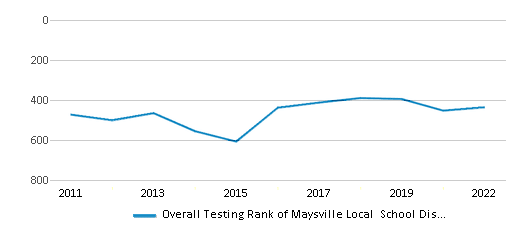
Math Test Scores (% Proficient)
50%
52%
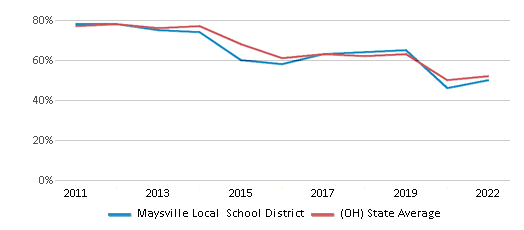
Reading/Language Arts Test Scores (% Proficient)
60%
60%
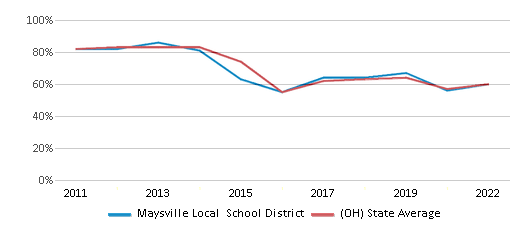
Science Test Scores (% Proficient)
74%
63%
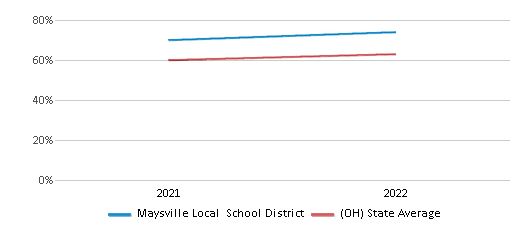
Graduation Rate
90-94%
86%
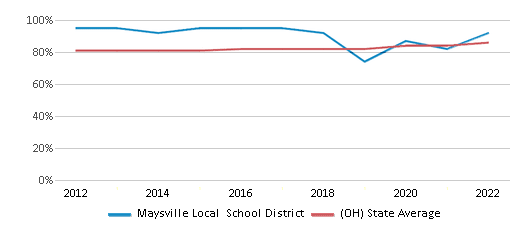
Students by Ethnicity:
Diversity Score
0.18
0.58
# American Indian Students
1 Student
462 Students
% American Indian Students
n/a
n/a
# Asian Students
3 Students
8,061 Students
% Asian Students
n/a
3%
# Hispanic Students
14 Students
30,384 Students
% Hispanic Students
1%
9%
# Black Students
28 Students
67,190 Students
% Black Students
1%
20%
# White Students
1,623 Students
204,949 Students
% White Students
91%
61%
# Hawaiian Students
n/a
329 Students
% Hawaiian Students
n/a
n/a
# Two or more races Students
123 Students
22,737 Students
% of Two or more races Students
7%
7%
Students by Grade:
# Students in PK Grade:
99
45,802
# Students in K Grade:
115
55,948
# Students in 1st Grade:
127
51,388
# Students in 2nd Grade:
125
49,073
# Students in 3rd Grade:
111
40,515
# Students in 4th Grade:
137
38,905
# Students in 5th Grade:
141
30,860
# Students in 6th Grade:
156
12,193
# Students in 7th Grade:
160
4,329
# Students in 8th Grade:
155
4,221
# Students in 9th Grade:
154
368
# Students in 10th Grade:
154
211
# Students in 11th Grade:
83
188
# Students in 12th Grade:
75
111
# Ungraded Students:
-
-
District Revenue and Spending
The revenue/student of $14,455 in this school district is less than the state median of $17,287. The school district revenue/student has grown by 5% over four school years.
The school district's spending/student of $13,794 is less than the state median of $17,235. The school district spending/student has grown by 5% over four school years.
Total Revenue
$26 MM
$28,879 MM
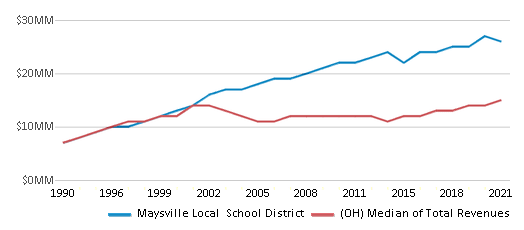
Spending
$25 MM
$28,792 MM
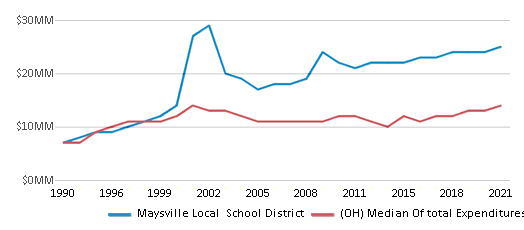
Revenue / Student
$14,455
$17,287
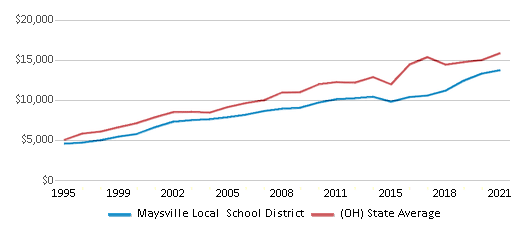
Spending / Student
$13,794
$17,235
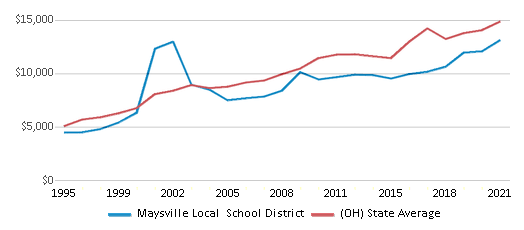
Best Maysville Local School District Public Preschools (2025)
School
(Math and Reading Proficiency)
(Math and Reading Proficiency)
Location
Grades
Students
Rank: n/an/a
3715 Panther Dr
Zanesville, OH 43701
(740) 453-0754
Zanesville, OH 43701
(740) 453-0754
Grades: PK
| 99 students
Recent Articles

What Is A Charter School?
Explore the world of charter schools in this comprehensive guide. Learn about their history, how they operate, and the pros and cons of this educational innovation. Discover key facts about charter schools, including admission policies, demographics, and funding, as well as what to look for when considering a charter school for your child.

10 Reasons Why High School Sports Benefit Students
Discover the 10 compelling reasons why high school sports are beneficial for students. This comprehensive article explores how athletics enhance academic performance, foster personal growth, and develop crucial life skills. From improved fitness and time management to leadership development and community representation, learn why participating in high school sports can be a game-changer for students' overall success and well-being.

February 05, 2025
Understanding the U.S. Department of Education: Structure, Impact, and EvolutionWe explore how the Department of Education shapes American education, from its cabinet-level leadership to its impact on millions of students, written for general audiences seeking clarity on this vital institution.





